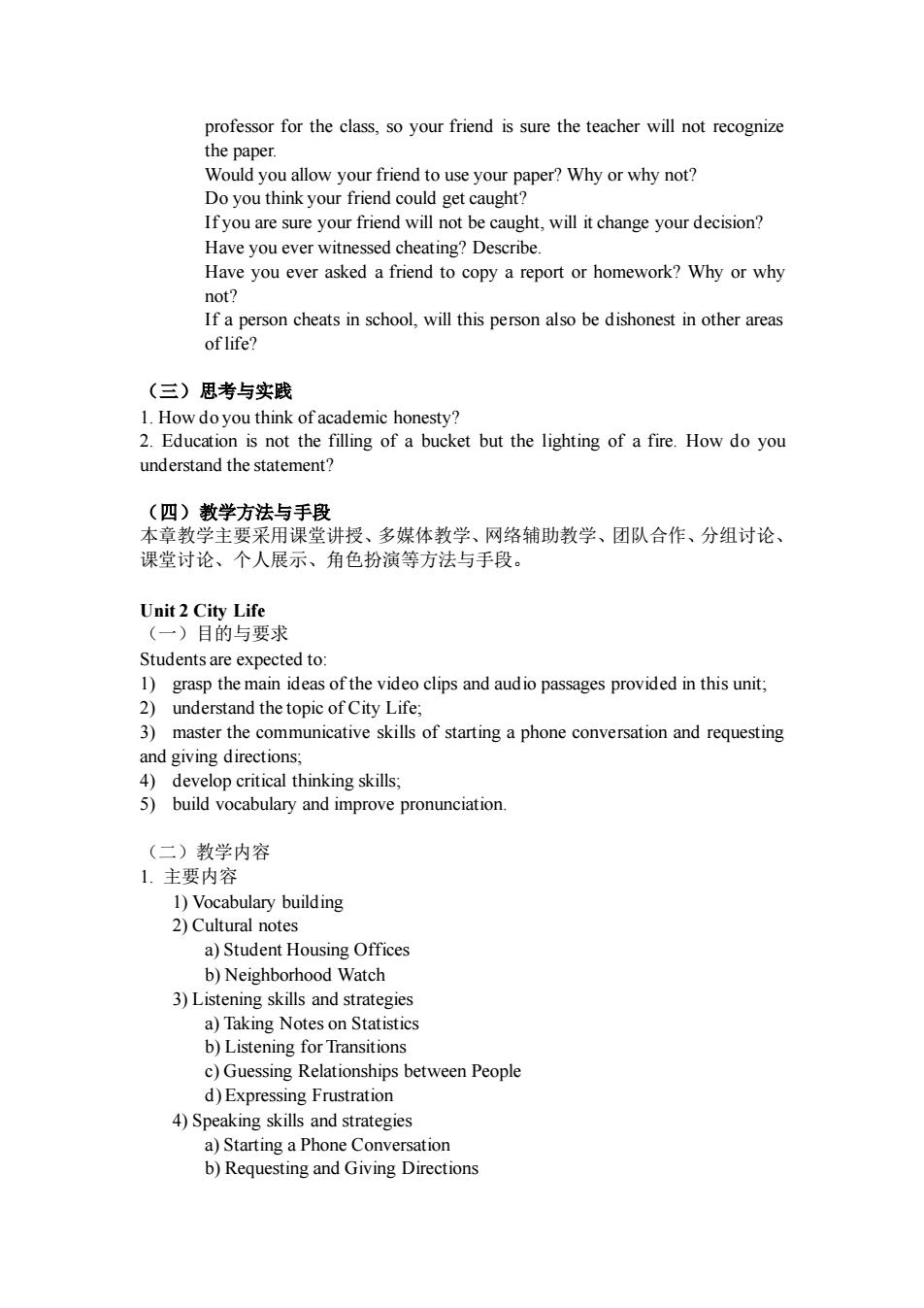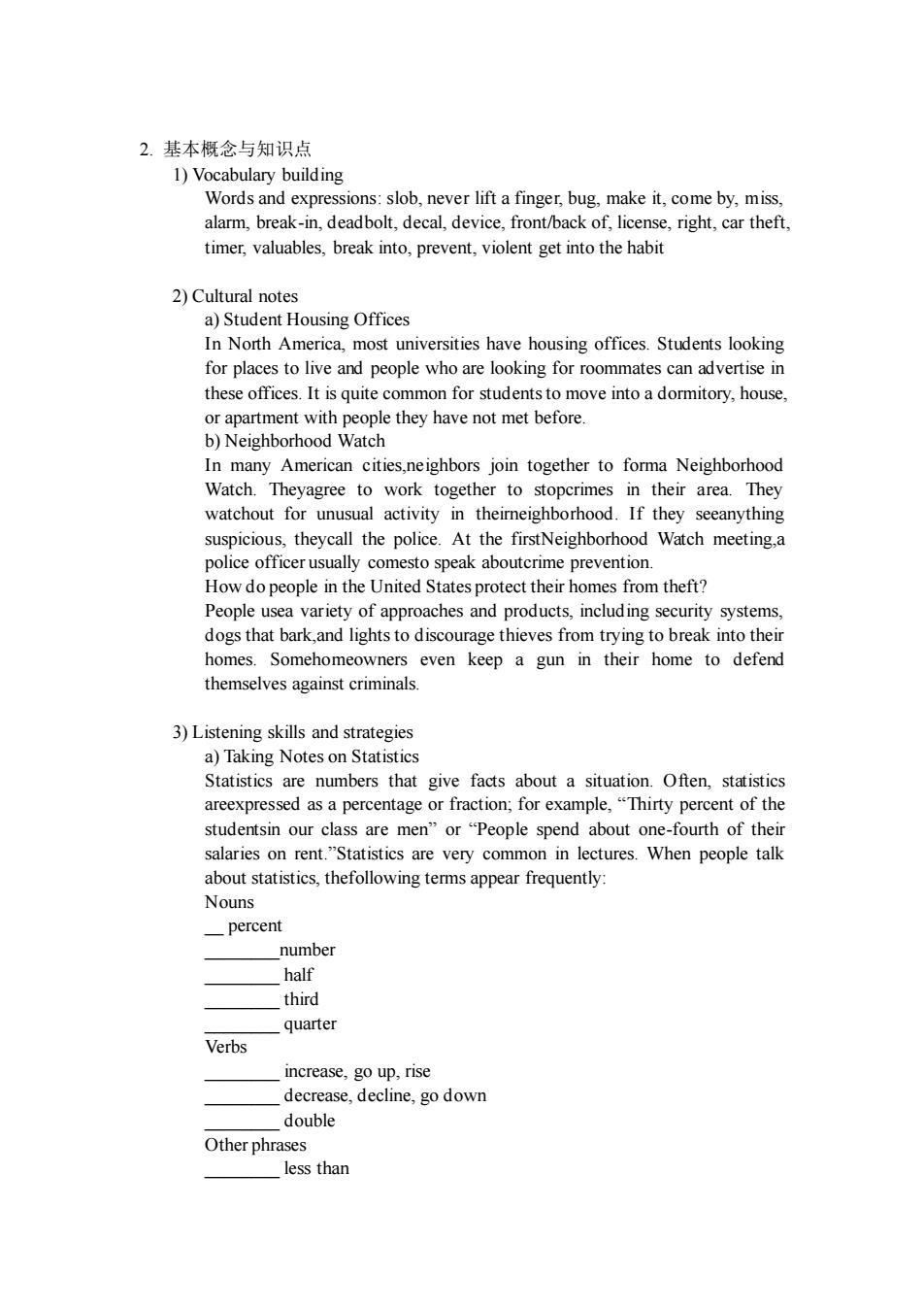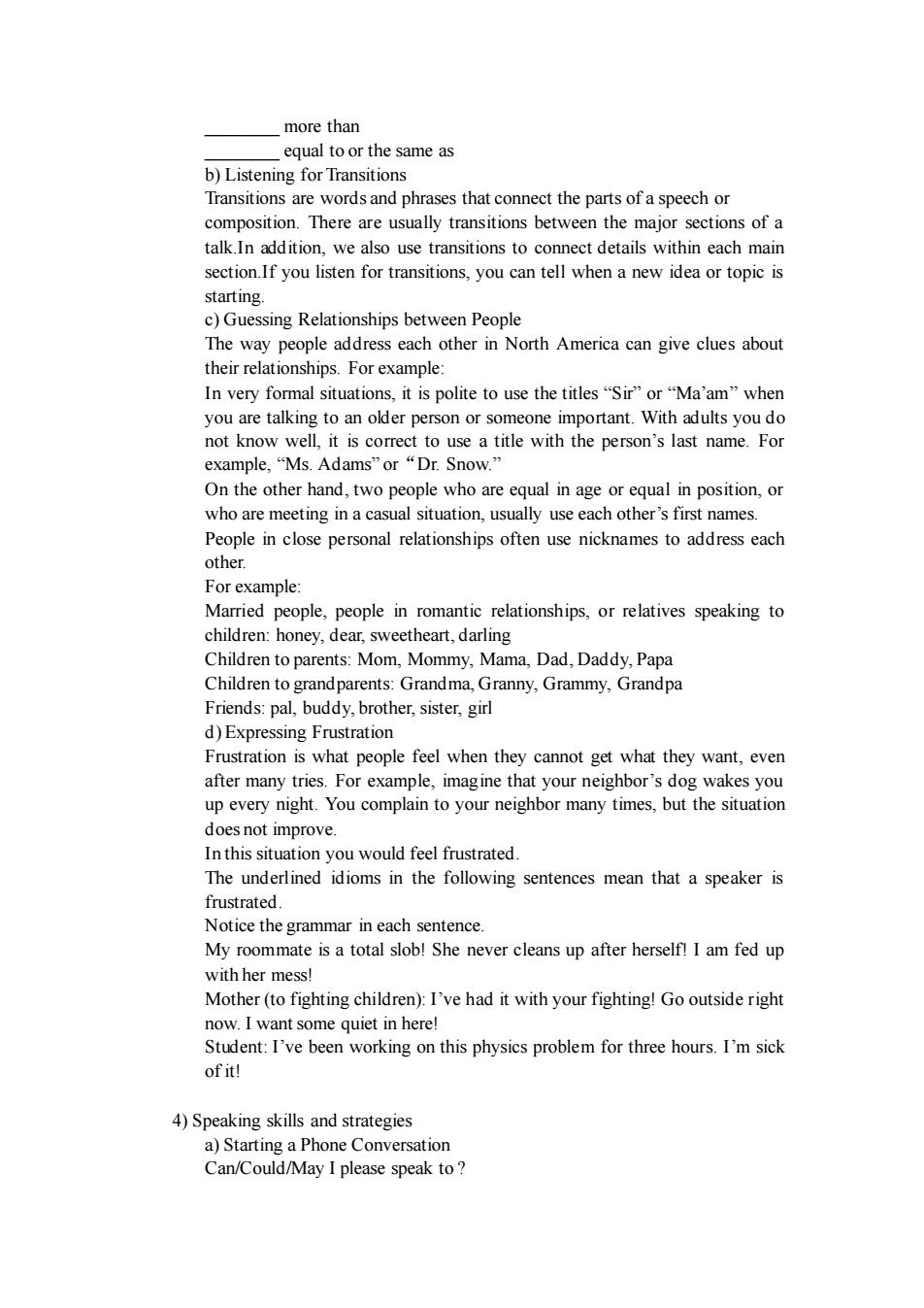
eo for the s,your issure the teacher will not epape Would you allow your friend to use your paper?Why or why not Do you think your friend could get caught? Ifyou are sure your friend will not be caught.will it change your decision? Have you ever witnessed cheating?Describe. Have you ever asked a friend to copy a report or homework?Why or why If a person cheats in school,will this person also be dishonest in other areas of life? (三)思考与实践 1.How doyou think honesty? 2 Education is o of a bucket but the lighting of a fire.How do you understand the statement? (四)教学方法与手段 本章教学主要采用课堂讲授、多媒体教学、网络辅助教学、团队合作、分组讨论、 课堂讨论、个人展示、角色扮演等方法与手段。 Unit 2 City Life (一)目的与要求 Studentsare expected to grasp the e m ain ideas of the video clips and audio passages provided in this unit 2)understand the topic of City Life; 3)master the communicative skills of starting a phone conversation and requesting and giving directions. 4)develop critical thinking skills 5)build cabulary and i improve pronunciation (二)教学内容 1.主要内容 1)Vocabulary building 2)Cultural notes a)Studen Housing Offices b)Neighborhood Watch 3)Listening skills and strategies a)Taking Notes on Statistics b)Listening for Transitions c)Guessing Relation hips be ween People d)Expressing Frustration 4)Speaking skills and strategies a)Starting a Phone Conversation b)Requesting and Giving Directions
professor for the class, so your friend is sure the teacher will not recognize the paper. Would you allow your friend to use your paper? Why or why not? Do you think your friend could get caught? If you are sure your friend will not be caught, will it change your decision? Have you ever witnessed cheating? Describe. Have you ever asked a friend to copy a report or homework? Why or why not? If a person cheats in school, will this person also be dishonest in other areas of life? (三)思考与实践 1. How do you think of academic honesty? 2. Education is not the filling of a bucket but the lighting of a fire. How do you understand the statement? (四)教学方法与手段 本章教学主要采用课堂讲授、多媒体教学、网络辅助教学、团队合作、分组讨论、 课堂讨论、个人展示、角色扮演等方法与手段。 Unit 2 City Life (一)目的与要求 Students are expected to: 1) grasp the main ideas of the video clips and audio passages provided in this unit; 2) understand the topic of City Life; 3) master the communicative skills of starting a phone conversation and requesting and giving directions; 4) develop critical thinking skills; 5) build vocabulary and improve pronunciation. (二)教学内容 1. 主要内容 1) Vocabulary building 2) Cultural notes a) Student Housing Offices b) Neighborhood Watch 3) Listening skills and strategies a) Taking Notes on Statistics b) Listening for Transitions c) Guessing Relationships between People d) Expressing Frustration 4) Speaking skills and strategies a) Starting a Phone Conversation b) Requesting and Giving Directions

2.基本概念与知识点 1)Vocabulary building Words and expressions:slob,never lift a finger,bug.make it,come by,miss. alarm,break-in,deadbolt,decal,device,front/back of,license,right,car theft. timer,valuables,break into,prevent,violent get into the habit 2)Cultural notes a)Student Housing Offices In North America,most universities have housing offices.Students looking for places to live and people who are looking for roommates can advertise in these offices.It is quite on for studen nove into a dormitory,house or apartment wit b)Neighborhood Watch In many American cities neighbors ioin together to forma neighborhood Watch.Theyagree to work together to stopcrimes in their area.They watchout for unusual activity in theimeighborhood.If they seeanything suspicious theyc all the police.At the firstNeighborhood Watch meeting.a police officer usually comesto speak aboutcrime prevention How do people in the United States protect their homes from theft? People usea variety of approaches and products,including security systems Somehor even keep a gun in the: to 3)Listening skills and strategies a)Taking Notes on Statistics Statistics are numbers that give facts about a situation.Often,statistics aree Thirty percent of the studentsin our class are men or "People spend about one-fourth of ther salaries on rent."Statistics are very common in lectures.When people talk about statistics,thefollowing terms appear frequently: Nouns -percent _number half third _quarter Verhs increase,go up,rise decrease.decline,go down double Other phrases less than
2. 基本概念与知识点 1) Vocabulary building Words and expressions: slob, never lift a finger, bug, make it, come by, miss, alarm, break-in, deadbolt, decal, device, front/back of, license, right, car theft, timer, valuables, break into, prevent, violent get into the habit 2) Cultural notes a) Student Housing Offices In North America, most universities have housing offices. Students looking for places to live and people who are looking for roommates can advertise in these offices. It is quite common for students to move into a dormitory, house, or apartment with people they have not met before. b) Neighborhood Watch In many American cities,neighbors join together to forma Neighborhood Watch. Theyagree to work together to stopcrimes in their area. They watchout for unusual activity in theirneighborhood. If they seeanything suspicious, theycall the police. At the firstNeighborhood Watch meeting,a police officer usually comesto speak aboutcrime prevention. How do people in the United States protect their homes from theft? People usea variety of approaches and products, including security systems, dogs that bark,and lights to discourage thieves from trying to break into their homes. Somehomeowners even keep a gun in their home to defend themselves against criminals. 3) Listening skills and strategies a) Taking Notes on Statistics Statistics are numbers that give facts about a situation. Often, statistics areexpressed as a percentage or fraction; for example, “Thirty percent of the studentsin our class are men” or “People spend about one-fourth of their salaries on rent.”Statistics are very common in lectures. When people talk about statistics, thefollowing terms appear frequently: Nouns __ percent ________number ________ half ________ third ________ quarter Verbs ________ increase, go up, rise ________ decrease, decline, go down ________ double Other phrases ________ less than

more than ual toor the same as b)Listening for Transitions Transitions are words and phrases that connect the parts of a speech or composition.There are usually transitions between the maior sections of a talk in addition.we also use transitions to connect details within each main section.If you listen for transitions,you can tell wher new idea or topic starting c)Guessing Relationships between People The way people address each other in North America can give clues about their relationships.For example: In very formal situations,it is polite to use the titles"Sir"or"Ma'am"when you are talkin an oer person or so not kr example."Ms.Adams"or "Dr.Snow. On the other hand,two people who are equal in age or equal in position.or who are meeting in a casual situation,usually use each other's first names. People in persoa relationships ofte n use nicknames to address each other For example. Married people,people in romantic relationships,or relatives speaking to children:honey,dear,sweetheart,darling Children to parents:Mom,Mommy,Mama,Dad,Daddy,Papa Childre en to grand s:Gra dma,Granny,Grammy,Grandpa Friends:pal,buddy,brother,sister,gir d)Expressing frustration Frustration is what people feel when they cannot get what they want,even after many tries.For example,imagine that your neighbor's dog wakes you up every night.You nlai to you neighb many tim es,bu the sit does not improve In this situation you would feel frustrated. The underlined idioms in the following sentences mean that a speaker is frustrated. Notice the grammar in each sentence My roommate is a total slob! She never cleans up after herself!I am fed up with her mess Mother(to fighting children):I've had it with your fighting!Go outside right now.I want some quiet in herel Student:I've been working on this physics problem for three hours.I'm sick of it! 4)Speaking skills and strategies a)Starting a Phone Conversation Can/Could/May I please speak to?
________ more than ________ equal to or the same as b) Listening for Transitions Transitions are words and phrases that connect the parts of a speech or composition. There are usually transitions between the major sections of a talk.In addition, we also use transitions to connect details within each main section.If you listen for transitions, you can tell when a new idea or topic is starting. c) Guessing Relationships between People The way people address each other in North America can give clues about their relationships. For example: In very formal situations, it is polite to use the titles “Sir” or “Ma’am” when you are talking to an older person or someone important. With adults you do not know well, it is correct to use a title with the person’s last name. For example, “Ms. Adams” or“Dr. Snow.” On the other hand, two people who are equal in age or equal in position, or who are meeting in a casual situation, usually use each other’s first names. People in close personal relationships often use nicknames to address each other. For example: Married people, people in romantic relationships, or relatives speaking to children: honey, dear, sweetheart, darling Children to parents: Mom, Mommy, Mama, Dad, Daddy, Papa Children to grandparents: Grandma, Granny, Grammy, Grandpa Friends: pal, buddy, brother, sister, girl d) Expressing Frustration Frustration is what people feel when they cannot get what they want, even after many tries. For example, imagine that your neighbor’s dog wakes you up every night. You complain to your neighbor many times, but the situation does not improve. In this situation you would feel frustrated. The underlined idioms in the following sentences mean that a speaker is frustrated. Notice the grammar in each sentence. My roommate is a total slob! She never cleans up after herself! I am fed up with her mess! Mother (to fighting children): I’ve had it with your fighting! Go outside right now. I want some quiet in here! Student: I’ve been working on this physics problem for three hours. I’m sick of it! 4) Speaking skills and strategies a) Starting a Phone Conversation Can/Could/May I please speak to ?